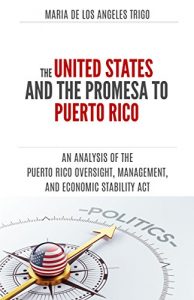Your guide to the U.S. Congress’s discussions and drafting of the PROMESA.
The Puerto Rico Oversight, Management, and Economic Stability Act, PROMESA, establishes an Oversight Board in Puerto Rico with review and certification powers over the Puerto Rico government.
Under PROMESA, although the Puerto Rico Governor and Legislature will still be elected by Puerto Ricans, their laws, regulations, executive orders, fiscal, financial and economic decisions must be reviewed and approved by an Oversight Board whose seven members are appointed by the U.S. President.
This is pretty much a throwback to the Foraker Act of 1900 under which the U.S. President appointed the Puerto Rico’s Governor, Cabinet members, and members of the Puerto Rico Supreme Court. The U.S. President also appointed the members of one of the two legislative chambers, which usually gridlocked with the chamber elected by Puerto Ricans.
The book analyzes all drafts of PROMESA and how the law’s language reflects the plenary power and control of the U.S. Congress over Puerto Rico; how tweaking with semantics did not diminish the colonialist aspect of the law; the hurdles in the law's implementation; and why it is indeed the Foraker Act for this century.
Some chapters are based on articles I published in LinkedIn throughout March and April 2016, that have been expanded for publication in the book.
The Puerto Rico Oversight, Management, and Economic Stability Act, PROMESA, establishes an Oversight Board in Puerto Rico with review and certification powers over the Puerto Rico government.
Under PROMESA, although the Puerto Rico Governor and Legislature will still be elected by Puerto Ricans, their laws, regulations, executive orders, fiscal, financial and economic decisions must be reviewed and approved by an Oversight Board whose seven members are appointed by the U.S. President.
This is pretty much a throwback to the Foraker Act of 1900 under which the U.S. President appointed the Puerto Rico’s Governor, Cabinet members, and members of the Puerto Rico Supreme Court. The U.S. President also appointed the members of one of the two legislative chambers, which usually gridlocked with the chamber elected by Puerto Ricans.
The book analyzes all drafts of PROMESA and how the law’s language reflects the plenary power and control of the U.S. Congress over Puerto Rico; how tweaking with semantics did not diminish the colonialist aspect of the law; the hurdles in the law's implementation; and why it is indeed the Foraker Act for this century.
Some chapters are based on articles I published in LinkedIn throughout March and April 2016, that have been expanded for publication in the book.












